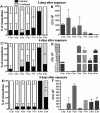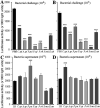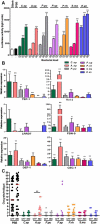Exploring Anopheles gut bacteria for Plasmodium blocking activity
- PMID: 24428613
- PMCID: PMC4099322
- DOI: 10.1111/1462-2920.12381
Exploring Anopheles gut bacteria for Plasmodium blocking activity
Abstract
Malaria parasite transmission requires the successful development of Plasmodium gametocytes into flagellated microgametes upon mosquito blood ingestion, and the subsequent fertilization of microgametes and macrogametes for the development of motile zygotes, called ookinetes, which invade and transverse the Anopheles vector mosquito midgut at around 18-36 h after blood ingestion. Within the mosquito midgut, the malaria parasite has to withstand the mosquito's innate immune response and the detrimental effect of its commensal bacterial flora. We have assessed the midgut colonization capacity of five gut bacterial isolates from field-derived, and two from laboratory colony, mosquitoes and their effect on Plasmodium development in vivo and in vitro, along with their impact on mosquito survival. Some bacterial isolates activated the mosquito's immune system, affected the mosquito's lifespan, and were capable of blocking Plasmodium development. We have also shown that the ability of these bacteria to inhibit the parasites is likely to involve different mechanisms and factors. A Serratia marcescens isolate was particularly efficient in colonizing the mosquitoes' gut, compromising mosquito survival and inhibiting both Plasmodium sexual- and asexual-stage through secreted factors, thereby rendering it a potential candidate for the development of a malaria transmission intervention strategy.
© 2014 Society for Applied Microbiology and John Wiley & Sons Ltd.
Figures






References
-
- Castro DP, Seabra SH, Garcia ES, de Souza W, Azambuja P. Trypanosoma cruzi: ultrastructural studies of adhesion, lysis and biofilm formation by Serratia marcescens. Exp Parasitol. 2007;117:201–207. - PubMed
Publication types
MeSH terms
Grants and funding
LinkOut - more resources
Full Text Sources
Other Literature Sources

